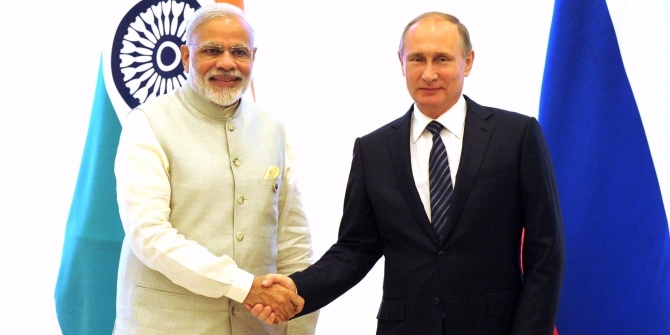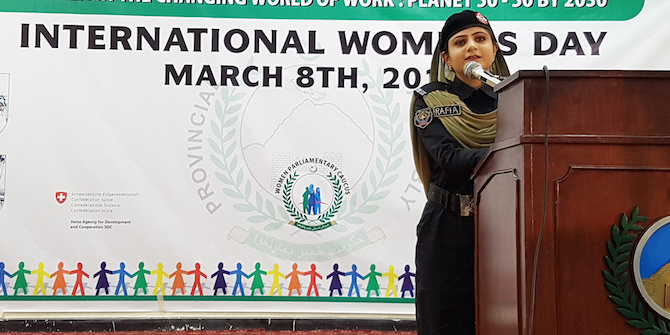Ruvani W. Fonseka (University of California) spent over two months amongst Sri Lanka’s rural tea plantations, where she found a non-profit working on the hills with a new generation of female workers fighting deeply ingrained gender norms. Here she explains how they are overcoming gendered divisions of labour, gender segregation, pressure to marry early, as well as long-held gender norms in a country known for its supposedly high levels of gender equality.
 Photo: Tea Plantation, Sri Lanka | Credit: Unplash,@jerrykavan
Photo: Tea Plantation, Sri Lanka | Credit: Unplash,@jerrykavan
Sri Lanka is often celebrated as one of the most gender-equitable nations in South Asia, with high literacy rates for women, low maternal mortality, and the distinction of having the first female prime minister in the world (Siramavo Bandaranaike, elected in 1960). Women in Sri Lanka however still face many barriers in a deeply patriarchal society: Sri Lanka’s parliament comprises of just seven per cent women, only one in three women work, and one in three married women face intimate partner violence. In the Sri Lankan rural hill plantations, called the ‘up-country’, women tea pickers perform difficult physical labour for many more hours per day than men working on the same plantations and are paid less; their earnings are also often controlled by male family members. Young women in the up-country in particular are often prevented from seeking work that is considered acceptable only for young men. They are also pressured to marry and have children early, restricting their educational and vocational possibilities.
In 2017, I lived and worked in a rural community in the up-country with staff of a non-governmental organisation working to improve the education and employment opportunities for young people in the tea plantations in Sri Lanka. The organization, which I refer to as the “Up-country Youth Organization” (UYN) to protect the identity of research participants, is staffed completely by alumni of the program who are all under 30 years old and are mostly female.
Over two months, I worked with UYN, interviewing local staff and alumni of the program on their perspectives for how the organization was challenging harmful gender norms in their community and empowering young women. The people I spoke to identified four major challenges for young women in their communities, and explained how their organization was helping young women to overcome them.
Pressure to marry early
Many girls and young women in the up-country felt pressure from their families and communities to marry at earlier ages than they wanted. UYN alumni, however, had developed their own strategies to delay marriage. One alumna described the ripple effect her increased confidence to say no had in her family: “Here I developed the courage to say no to my family with good reasons to many proposals…just because of me, other relatives have skipped their wedding and have gone to follow higher education.” Another female staff member described how her work at UYN allowed her to postpone marriage: “When I joined UYN there was a proposal. I said ‘No, I joined the course. Let me finish this and see.’…I joined here as an intern, then I had a job. I said for three years ‘I can’t get married. I have signed a contract.’” The skills taught at UYN on advocating for oneself and the increased opportunities for young women to extend their schooling and work outside of home have given young women in the up-country new techniques to reject early marriage and set their own terms for when they are ready to marry.
Gender segregation of young adults
Many of the participants described feeling obligated to segregate in school and social settings into single-gender groups and not interact with members of the opposite sex. However, staff at UYN developed strategies to integrate the genders in their classrooms and projects, with one alumna saying: “here, students mingle with everyone…we are different than a government school.” This gender integration allowed young men and women to learn how to interact respectfully with each other and to think of each other as equals – one male alumnus expressed this by saying: “UYN helped me to become closer to girls and to understand them. And it brought the perspective of gender.” Through the supported gender integration at UYN, young adults are able to make cross-gender friendships and to understand each other in a way that is difficult in their normal gender-segregated environment.
Gendered divisions of labour
One major problem in the up-country, as well as throughout Sri Lanka, is the expectation that women and men should do different types of work, with men better suited for work outside of the home and women and girls more suited for household work. UYN seeks to both encourage gender-equal divisions of labour within the organization as well as to support female students looking to seek work in non-stereotypical positions and locations. UYN’s career coordinator, a young woman herself, had this to say about how she encourages young women to work: “When I want to get good jobs for the girls, they will always tell that ‘we can’t go out of [this community], our parents will not let us go.’ I just need to change that thought…[I have succeeded] with a lot of the girls, I have talked to their parents…I ask the parents to come and talk to me. I say ‘if you have problems you can call me and I will respond.’” By providing direct support to young women seeking employment and helping them to negotiate with their families, UYN allows young women to challenge the gendered division of labour expected in the up-country.
Gender-inequitable norms
The final problem identified by the young adults I spoke with was the limitations placed on women and girls by gender-inequitable norms in their families and communities. UYN’s main strategy to challenge harmful gender norms has been to provide young women with leadership and work opportunities that allow them to become role models for change in their community. As one female staff member said: “In the outer world, these places would only be given to men, but here it is the opposite. All the chances will be given to us. It’s good because we can go and make other changes.” A male alumnus described how seeing women in leadership helped him to think about women differently: “This was where I learned under a female principal for the first time, and had a lot of female teachers. I learned what sort of changes a female can make. My [main] teacher was a female. I understood the improvement that women can give a community.” Through UYN’s empowerment of young women leaders, the organization is able to challenge the harmful gender norms that suggest women cannot lead and contribute to society like men.
In a little over two months, I glimpsed how young adults from the Sri Lankan up-country were challenging community expectations around early marriage, gender segregation, gendered division of labour and inequitable gender norms. Their stories provide many examples of how gender equality can be advocated for by rural youth in a highly patriarchal environment. As one young adult said when describing his generation’s potential to change the future: “If we start with our generation, it will change…If we change, that is how we can change our community.”
The longer article summarized in this blog can be read on Gender and Development (paywall) or on Oxfam’s policy and practice website.
This article gives the views of the author, and not the position of the South Asia @ LSE blog, nor of the London School of Economics. Please read our comments policy before posting.
Ruvani W. Fonseka, MPH, MSW is a Sri Lankan-American PhD student at the University of California, San Diego Center on Gender Equity and Health (GEH) @GEH_UCSD studying Public Health. rfonseka@post.harvard.edu







